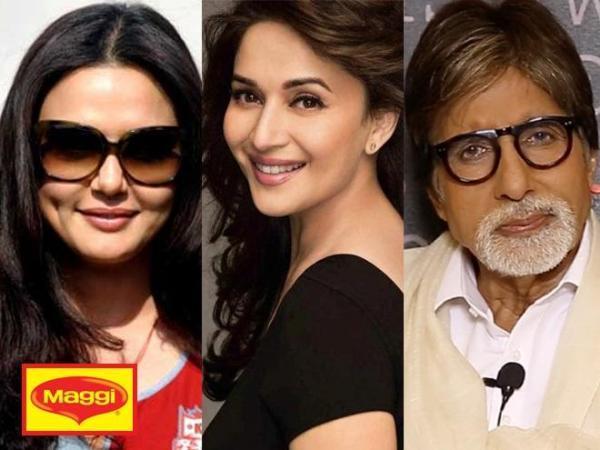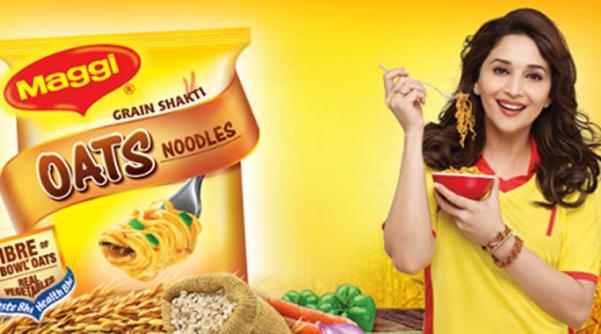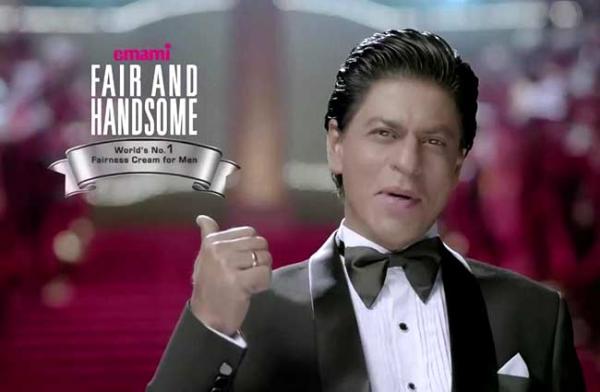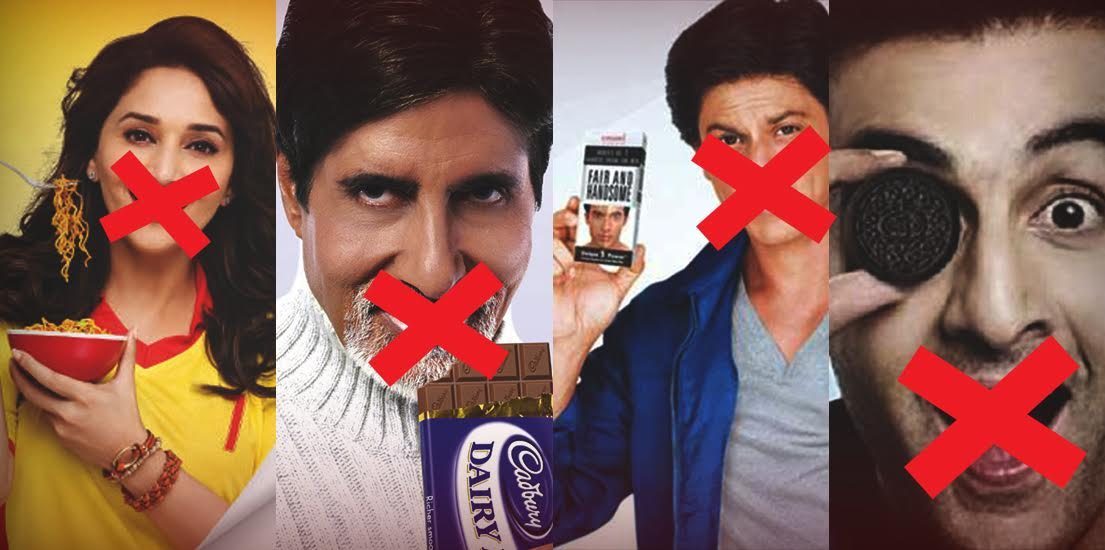How liable are celebrities for the brands they endorse?
India — a country sprawling and diverse in geography and people — is highly influenced by its celebrities and what they endorse; in particular, our cricket personalities and Bollywood actors. Certain celebrities have become almost synonymous with certain brands over the years, with endorsements and the personality of brands developing a close, if at times unlikely, relationship.
A recent fiasco has given rise to a new development that could change the game in the brand endorsement industry, though; a proposal by a parliamentary panel suggests that if an ad that a celebrity has featured in is found to be misleading, he or she is liable to pay fines to the tune of Rs 50 lakh or serve a 5-year jail term.

One endorsement to bind them all: these three actors have been in hot water since the Maggi fiasco.
“The committee recommends that for first-time offence, the offender may be penalised with either a fine of Rs 10 lakh and imprisonment up to two years or both, for second-time offence, a fine of Rs 50 lakh and imprisonment for five years and for subsequent offences, the penalties may be increased proportionately based on the value of the sales volumes of such products or services,” the committee had said in its report.
With ads increasingly spilling over into the digital medium from television, it’s more important than ever to think for ourselves and to ask the right questions surrounding the issue. Celebrity endorsements are far more pervasive than we think, helping to create a brand that makes a lasting impression on us, the consumers.
Let’s take a look at an incident that dominated headlines in recent times — our favorite ‘2-minute noodles’ that got into hot water last year. Maggi noodles have been a childhood staple for Indian millennials, and when Nestle India pulled out countless packets of these after reports of them containing MSG (mono sodium glutamate) and high lead content, it came as a shock for the country.
Brand ambassadors Amitabh Bachchan, Madhuri Dixit and Preity Zinta were slapped with a notice by consumer rights forums directing them to not ‘falsely represent’ Maggi’s quality and safety, with a FDA notice also being sent to Madhuri Dixit to explain within 15 days the claims made in the advertisement regarding the nutrition value of the ‘2-minute noodles’.

A screenshot from a Maggi ad featuring Madhuri Dixit.
While known for being an onscreen talent and the dancing queen of India, Madhuri Dixit is hardly a nutritionist or a scientist — neither does she claim to be. If the Centre accepts the report of the parliamentary panel on changes in the Consumer Protection Bill 2015, the 90’s star could be looking at severe penalties for food safety violations.
A separate case has been launched by a local advocate in UP against Madhuri Dixit, Preity Zinta and Amitabh Bachchan as ‘these film stars have earned hefty sums by terming Maggi noodles as healthy in advertisements’ and alleged ‘this wrong publicity amounts to malafide intentions and playing with the health of the kids and young people of the country’. “Since they promote the sale of a product making false claims, there was a strong view that such persons must be made to pay along with the manufacturer or promoter,” said a government official.
It is important to remember that nuance is key, and it is quite bizarre to blame ambassadors for a brand’s transgressions which are out of their circle of competence or awareness. How can Amitabh Bachchan or Madhuri Dixit be expected to know the lead content level in Maggi unless they personally run a testing lab?
“I agree that celebs should accept endorsements with a certain amount of responsibility. But it is unfair to make them accountable for products/ads as the subject is technical and requires sound understanding of science as it’s related to the ingredients of the product and consequent claims,” Madison World Chairman Sam Balsara told PTI.
Another case of a celebrity endorsement gone awry would be with Genelia D’souza, against whom an FIR was launched for appearing on the brochures and ads for a real estate company that turned out to be fraudulent.

Genelia D’souza was the face of a real estate company, that turned out to be fraudulent. Source: shortday.in
Advertising toes a tricky line between marketability and social responsibility, and actors definitely need to have a sense of the latter, but it is important to recognize when the responsibility lies with the actor and when it is the company that’s responsible.
Prahlad Kakkar, renowned filmmaker, answers the question with one of his own. “When politicians make a claim in their rallies, and don’t live up to it after they’ve been elected, are they liable? Who is the government to senselessly call out people who have absolutely nothing to do with the manufacturing process?”
He explains that celebrities are the good-looking faces with a fan following, who are at the end of the advertising chain — after all the products have been tested to ensure that they meet standard regulations to qualify as a government-approved product. “This is something that they do for money, as work, and while they do have an obligation, it is not a legal one, but a moral one.”
READ: BRAND PLACEMENTS NEED TO BE DONE IN A SUBTLE, YET CLEVER WAY – NIKHIL KHATRI
For instance, Shah Rukh Khan featured in a Fair and Handsome ad that promised a lighter skin colour for men in 3 weeks. Nikhil Jain from Delhi bought the Emami skin fairness cream in 2012, and when, 3 weeks later, his skin colour remained the same, he took the issue to a consumer forum. For two and a half years, he challenged Emami for Unfair Trade Practices, and finally won; he was compensated with Rs 10,000, and the ad was pulled off air.
“The only thing a celebrity can do if the brand comes under fire is to move away from it or step down as brand ambassador,” said Vinita Bangad, founder of Krossover Entertainment, that manages the likes of Priyanka Chopra and SRK. “How can he be held responsible when a brand fails to keep its promise? He wouldn’t have the know-how about the manufacturing process. It’s like blaming a brand endorser of a soft drinks brand for a fault in the manufacturing line six months after the contract is signed.”

Of course, the larger lesson here that needs to be addressed is that it is high time India’s light skin complex is done away with. “India’s obsession with fairness is a cultural issue, and advertising only jumped on that bandwagon much later. It’s like a hangover from the colonial era; I personally think we should ban the idea of skin-lightening products, but not all celebrities feel they are similarly liable. If celebrities have a conscience, they shouldn’t endorse products like alcohol and cigarettes. Amitabh Bachchan for instance stopped endorsing Pepsi a few years ago, when a little girl infamously called it ‘poison’ and asked why he endorsed it. There is a way to take moral responsibility as celebrities,” reasons Prahlad Kakkar.
While we laud Nikhil’s tenacity in getting the compensation he deserved from Emami, we hope he learnt (the hard way, perhaps) that while skin lightening might not give him the results he wants, determination definitely does.
When a personality like Shah Rukh Khan endorses a brand subscribing to regressive values, he shirks his moral responsibility for a pay cheque — and this is the kind of responsibility that celebrities should show, and can be criticized for, especially considering the massive following they have.
Other cases depict how moral issues often have their own grey areas. Homi Adajania’s My Choice video for Vogue featuring Deepika Padukone, for instance, might have had its heart in the right place, but a lot of the message got lost in translation. Deepika got a lot of flak for certain references made in the video; her justification was that while she didn’t agree with all the lines, she went ahead ‘for the larger message the film was trying to make’.
More importantly, it was the mixed messages about her own understanding about feminism that she sent out in that ad that I find a problem. While the ad was not retracted, it received a lot of criticism — rightfully so. Vogue has been one of the leading brands propagating a certain set idea of female beauty, and also targets only a certain class of society in India.
While Deepika Padukone has also featured in ads for products such as Kellogg’s Special K and Garnier Fairness cream in the past, her recent Nike ad took the internet by storm as the first Indian ad to focus on women’s sports and fitness, when it released in August, 2016. Complete with a catchy rap song and editing to make your heart race, the ad is commendable for being the first of its kind in our country, but it’s worth mentioning that Deepika Padukone, who used to play national-level badminton but is no longer a sportsperson, remained the focus of the ad while the range of Indian sportspersons and models who are also featured remained largely obscure. Regardless, we’re happy to see the direction that Deepika Padukone’s endorsements are now taking.
In the case of the Shah Rukh Khan fairness cream ad and the Vogue ad, holding celebrities responsible to a certain extent for the products or brands they endorse does make sense. But when Yana Gupta appeared in a video for Kingfisher Airlines, conveying safety instructions before take-off for Vijay Mallya’s ‘premier world-class airline’ — little was she to know that Kingfisher would go from bang to bust, and that Kingfisher would default on its loans, with Mallya fleeing the country 9000 crores in debt. Yana Gupta is not a fortune-teller, and to think she should have known otherwise would be absurd.
Luckily for us, we do have instances where celebrities have rooted for some issues that matter. Nimrat Kaur’s appearance in Titan’s Raga ad is a memorable one, where a meaningful dialogue on ‘#HerLifeHerChoices’ took place.
Another very interesting series of videos is one from ‘Unblushed’, featuring personalities like Kalki Koechlin, Sayani Gupta, Radhika Apte and Nimrat Kaur. Over the course of the series, issues ranging from feminism to Section 377, and marijuana to identity and moral consciousness are discussed with a lot of sensitivity. Don’t miss out on ‘The Printing Machine’ video, it’s a powerful invective against a culture that’s going morally bankrupt.
READ: BEST INDIAN AD CAMPAIGNS OF THE LAST DECADE
Lastly, let’s not forget Ranveer Singh’s groundbreaking Durex ad that sent waves across the country. Treating sex in a fun and accessible way that made people laugh, especially in a country that tends to lack a sense of humour, it sent out an important message without taking itself too seriously. Even though the ad received some ire, it hasn’t been pulled down and has definitely succeeded in creating an impression.
As of end of August, a consensus appears to be surfacing amongst ministers headed by Finance Minister Arun Jaitley: celebrities endorsing brands in misleading advertisements may not face imprisonment, but will have to shell out hefty fines. The consumer affairs ministry, on the other hand, continues to push for jail time as recommended by the parliamentary committee.
“There was an alternative view against jail term,” one of the ministers said. “It was suggested that a more desirable provision could be imposition of exemplary monetary penalty for misleading endorsements.” The ‘exemplary penalty’ was cited to be to the tune of more than Rs 1 crore at the meeting.
If we really do care about consumer rights to the extent that we claim to, we would do well to examine more closely the intention behind an ad, and that of its ambassador, to clearly differentiate who stands for what, before jumping the gun.
Disclaimer: The opinions expressed within this POV/BLOG are the personal opinions of the author. PANDOLIN is not responsible for the accuracy, completeness, suitability, or validity of any information on this blog. All information is provided on an as-is basis. The information, facts or opinions appearing on the POV/BLOG do not reflect the views of PANDOLIN and PANDOLIN does not assume any responsibility or liability for the same.



